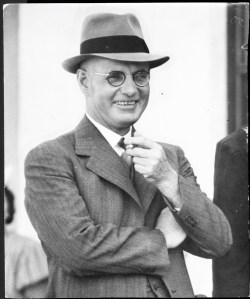
An update on my previous post. To recap, I thought I’d found two independent sources for the legend that on 21 February 1942, in the middle of the ‘cable war’ with Churchill about where returning Australian troops were to be sent, John Curtin went missing and, in the words of Peter Fitzsimons’ column last week, ‘Frederick Shedden organised for messages to be put up on screens in the city’s theatres around Canberra, broadly saying, if you are the Prime Minister, phone home’. One source is a 1995 interview with John Burton, who had then been head of External Affairs, and the other is an unreferenced lengthy quote labelled ‘Shedden’s words’ in a speech by David Black in 1998. But examining these two sources side by side, they are far too similar to be independent of each other. The sequence is exactly the same, the incidents included are exactly the same, and a couple of phrases are nearly verbatim.
| John Burton interview 1995 | ‘In Frederick Shedden’s words’ (d.1971) quoted in David Black speech 1998 |
| There wasn’t a minister around. No one wanted to be responsible for making this decision. No one could find Curtin. | We were trying to find Curtin because a decision had to be taken and a reply had to go back to Churchill. |
| We sent messages—there were only two cinemas in Canberra then—we sent messages and put it on the screen: “Is the Prime Minister there?” No responses. | We even put messages on the screens in Canberra theatres searching for him. |
| Finally, just before midnight, Curtin walks in. | In he came about midnight. |
| He had been walking around Mount Ainslie contemplating, contemplating. | He had been walking around Mount Ainslie. |
| He knew full well he had to make this decision. No one else would stand by him. | He knew that he had to make the decision, that he was not going to get support from anyone. |
| So, he walks in and asks Shedden for a typist and dictates this letter and telegram to Churchill saying: “If any lives are lost as a result of your action, you’ll be held publicly responsible. Send these people straight back.” | [Having asked for a stenographer] he dictated the telegram to Churchill saying that if anyone was lost as a result of the fleet being diverted Churchill would be held responsible. |
Are we to believe that Shedden gave the account on the right in an unknown source before he died in 1971, only for Burton to spontaneously use the same sequence, content and phrases in an interview in 1995? And that the first usage of the unidentified Shedden source would occur 27 years after his death, soon after Burton told such a similar account? It’s also interesting that the bracketed interpolation replaces the phrase which would show it is not Shedden speaking ‘he walks in and asks Shedden for a typist’.
In the more informal context of a speech which wasn’t meant to be for publication, it seems likely to me that the 1998 ‘quotation’ is a paraphrase of the 1995 Burton interview, mislabelled as coming from Shedden when it actually came from Burton. The transcript was probably not available at that point and the ‘quote’ could have come from notes jotted down while listening to the recording.
It has come to matter because David Day’s 1999 biography of Curtin quotes from Black’s speech rather than identifying the original source. As the most comprehensive cradle-to-grave biography of Curtin, Day’s book has been the authoritative reference point for journalists like Peter FitzSimons and many others. You can see how easy it is for biographies to consolidate mythology.
Of course, the story might be true – we still have an oral history in which Burton says that was what happened, albeit 53 years later. But I think writers using the story need to trace it back to Burton’s interview and should probably express some caution about it, recognising the distortions possible in memory. For me, the play of uncertainties, contradictions, and gaps in sources is part of the thrill of biography.
Did cinemas have the technology for posting a message on the screen and was that a regular occurence? If so, it makes the story more plausible and less remarkable. But the more biographically interesting point is the idea that Curtin would slip away without telling anyone at such a key moment and need time alone.
